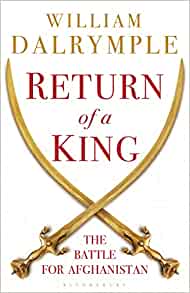 Return of A King, by William Dalrymple
Return of A King, by William Dalrymple
Being about Britain’s first involvement in Afghanistan in 1839-42. The Brits persuaded themselves the Russians were poised to come flooding through Persia and Afghanistan and into India, so obviously Afghanistan needed bolstering up as a buffer zone. The country had a popular, capable and very pro-British Shah, but despite all that the Brits decided their preferred man was the ex- Shah that the current one had usurped the throne from 30 years earlier. So they invaded the country to install him. Even the march in drew comparisons with the Retreat from Moscow – and that’s in the diary of one of the officers involved – but still they managed, just. The new/old Shah was re-installed on his throne but to keep him there the Brits had to occupy the country, making it clear he was just a puppet and doing everything they could to annoy and alienate the people they were meant to be ruling. Ultimately the country rose and the army had to pull out in an operation that makes the Retreat from Moscow look like a pleasant summer’s day stroll. (At least the original had survivors: the number of survivors of this one barely made it into three figures.) The British general in charge makes our World War I leaders look like Rommel. I’m enjoying these comparisons.
The Brits duly sent an Army of Retribution, which was its official name, so little scope for ambiguity in the mission statement, commanded by a general who actually could practise recto-ulna differentiation and who walked all over the Afghan resistance. The army razed Kabul to the ground and committed a series of what nowadays would be called war crimes, which disgusted even some of the perpetrators, as shown in their diaries.
The puppet Shah hadn’t survived the insurgency so his son was hastily declared Shah, swearing renewed love and fealty towards the British. At this point the British unblushingly announced they were reneging on all the treaties agreed with his father and pulling out of the country altogether. The whole fiasco was proving so expensive that the East India Company was on the verge of bankruptcy and had already had to take out an emergency loan to pay salaries. The new Shah hastily abdicated in favour of his younger brother and marched out with the British. To no one’s surprise, the ousted Shah then crept back and took control again, thus proving the one man to get anything at all from the entire venture. He remained pro-British and abided scrupulously with the terms of the treaties he had made with us.
In the final chapter, the author – a descendant of one of the survivors – describes his journey to Afghanistan in the wake of the US withdrawal to research the book. He meets descendants of the insurgents who of course remember it all like it was yesterday and they get on famously. The last line of the book comes from a tribesmen who casually says how they have now broken the English, the Americans and the Russians: “It will be the Chinese next.”
